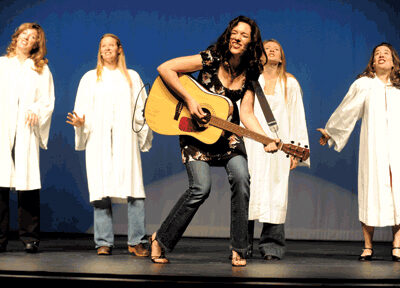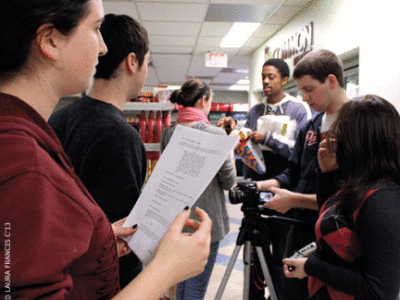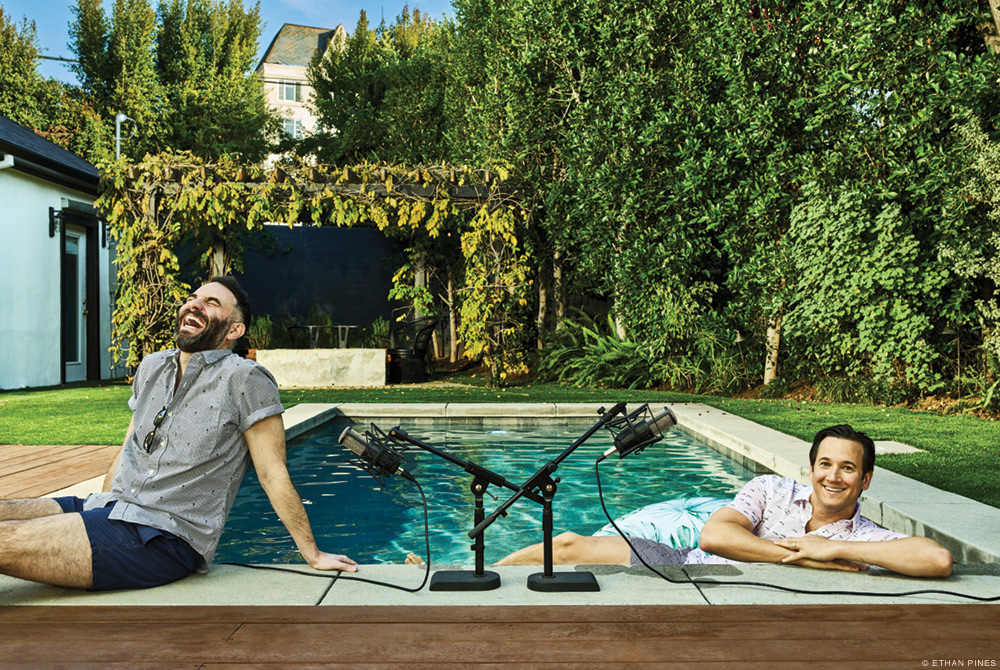
For the past 20 years, Aaron Karo W’01 and Matt Ritter L’05 have been part of a unique friendship tradition called “Man of the Year” with their childhood buddies. Now, the fellow comedians and writers have launched a podcast of the same name to encourage other men to create, maintain, and grow their own friendships.
By Dave Zeitlin | Photography by Ethan Pines C’92
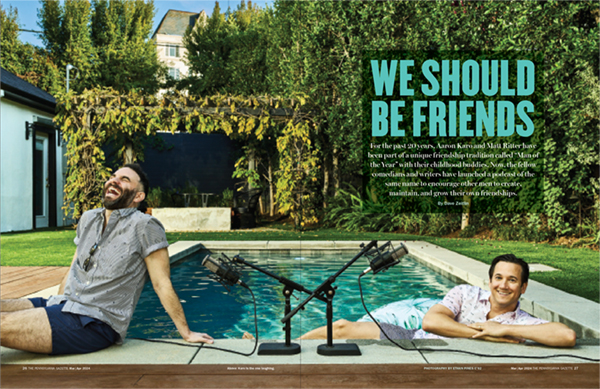
“I just think with a lot of guys, they haven’t had falling outs … they’ve had falling offs.”
Matt Ritter L’05 is sitting in a Manhattan hotel lobby with Aaron Karo W’01, his lifelong friend with whom he cohosts a podcast about male friendship, when he puts forth this epiphany.
“Oooh, have we used that already?” Karo says, looking over at Ritter and leaning forward in his seat.
“No, I just coined that!” Ritter replies excitedly.
“Dude, write that down,” Karo exclaims, before the two share an awkward high-five. “Genius!”
It’s the Tuesday afternoon before Thanksgiving and the two buddies have been buzzing all day—and will soon be sharing more embraces and laughs deep into the night. On tap for the evening is their annual “Man of the Year” dinner, in which Karo, Ritter, and seven other longtime friends meet at Brooklyn’s Peter Luger Steak House to vote on which friend had the best year. The tradition, Karo says, has kept their friendship going strong for 35 years—and became the foundation for the podcast Karo and Ritter launched in late 2022, also called “Man of the Year.” The podcast, which has been featured in the New York Times and on the Today show, is designed to help men make new friends and reconnect with old ones, often through yearly traditions like theirs.
But before embarking on their steak dinner (and pregame and postgame drinking festivities that rekindle their youth), the two 40-something native New Yorkers stop at a hotel lobby near Penn Station to discuss their unique tradition—and the art of male friendship—with another 40-something native New Yorker (me) who took a train from Philly to meet them on a day they call their “Super Bowl.” This one felt like an even bigger gameday as it marked the 20th consecutive “Man of the Year” dinner for the nine friends who grew up together in Plainview, Long Island. With a touch of childhood nostalgia, Karo and Ritter were reminded of the meaning of it by family members after they had flown back to the East Coast from Los Angeles, where they both work as comedians and screenwriters.
“My mom ironed my shirt today,” Ritter tells me when I arrive. “Steamed it, actually.”
“My dad dropped me off at the train station and was like, ‘Good luck, I love you,’” adds Karo with a laugh.
It’s not uncommon for people to reconnect with old friends in their hometowns the night or two before Thanksgiving, and annual Friendsgiving dinners probably rival family Thanksgiving celebrations for some. What anchors this reunion, among other quirks, is the giant trophy in tow, engraved with each winner’s name, which they plop on Peter Luger’s long wooden bar while waiting for their table. “It creates a scene and people are always coming over and asking about the trophy and what it means,” says Jason Epstein W’01, who along with his brother David Epstein C’01, rounds out the crew’s Penn contingent.
The dinner’s setting also adds to the charm: an old-fashioned steakhouse that’s been “marinating in history” since the late 1800s, as Karo puts it—though hasn’t exactly kept pace with the city’s fine dining vanguard. That’s what they like about it: a group of buddies trying to recapture the past inside of a place seemingly frozen in time.
“They took away their Michelin star,” Ritter says, “and we’re like, ‘Good! Who even knew they had a Michelin star?’”
“We actually prefer Michelin-less,” Karo chimes in.
The dinners are “a bit of a sacred experience,” Karo notes, that can “get pretty rowdy.” There’s yelling and singing at their regular corner table, and more than enough dry-aged beef, thick-cut bacon, and martinis to go around. The “Man of the Year” voting happens near the end after one friend nominates another based on his personal or professional accomplishments in the past year (Fiscal Lugar Year, or FLY). “You’re not allowed to vote for yourself,” Karo says. “That’s called the Ritter Rule,” after the time when Ritter did indeed vote for himself (“It wasn’t a high point,” he says sheepishly), precipitating their “first and only constitutional crisis,” in the words of Karo, the group’s “parliamentarian.” During that regrettable episode, which led to a contested tie vote, a man celebrating his 91st birthday toddled over to their table to see what the hullabaloo was about. Turns out, he was a retired federal judge who listened to arguments, decided the “Man of the Year” that year, and gave them his business card in case his services were ever needed again. Ritter, a former corporate attorney, lost his case. “That’s how you know I wasn’t meant to be a lawyer,” he says.
Once the voting is completed, the winner “gets the trophy, you chug a beer out of the trophy, you get your name engraved on it, and much to your wife’s chagrin, you have to keep it in your house for the next year,” explains Karo, who, along with Ritter, has won twice before (but not this past year). “It’s like the Stanley Cup.”
If this all sounds a tad highfalutin, “it’s not really about the winning,” says Jason Epstein. “It’s just about being there and experiencing the friendship and the night.” More than anything, it’s about the inside jokes they’ve had since they hung out in abandoned Long Island parks as teenagers, and the Blink-182 songs they blast in the Uber to and from the restaurant that remind them of high school parties. That’s why they encourage their podcast listeners to build or maintain yearly get-togethers of their own, whether it’s a weekend fishing trip, a couple of hours at a fantasy football draft (my 20-year tradition with college friends), or something even weirder. The simple truth is that as men get older, and especially as they sink into family life, many have trouble making the time to see their oldest friends. And it can be even harder for some adults to know where to make new ones. According to a 2021 survey, 15 percent of men reported having zero close friends—a figure Karo and Ritter have cited in their campaign against the “friendship recession.”
“We’re not saying everyone needs to have a trophy,” says Karo. “Like, you don’t even have to have a dinner even. It’s more about a ritual. The reason why you don’t see your friends is because you don’t make time for them—because you don’t have a recurring event.”
“We didn’t realize how lucky we were to have this group,” says Ritter. “The thing we always hear is, I wish I had something like that. So that’s been our biggest thing: It’s never too late. You can start a friendship tradition. We think that’s the backbone of lifelong friendships.”
Ruminating on Ruminations
Alumni of a certain age might recognize the name Aaron Karo—especially those who attended Penn toward the end of the 1990s or early 2000s.
Before most college students had social media and smartphones, before they read blogs or wrote on Substack, Karo was “the definition of viral before viral was even a word,” as he puts it.
It all started his third week as a Penn undergrad in 1997. Unable to fall asleep on a Sunday night, he popped out of bed at around 2:30 a.m. in his single dorm room in the Quad and started typing an email on his desktop computer. He sent it to a few friends (some from high school, some he had just met in college) with the subject line: Ruminations on College Life. “Did I know what the word ruminations meant?” he says. “I don’t know.” He also didn’t know that spontaneous middle-of-the-night email would “change the course of my life.”
Karo had no aspirations of being a writer at that point but his ruminations (read: a lot of thoughts about getting wasted and falling asleep in class) made people laugh and seemed to resonate with other freshmen also adjusting to college. So he started writing more of them. The jokes, he says, “were not high art”—throwing up in his shoe after a night of drinking; that “one all-purpose cup that you use for everything from cereal to orange juice to shots of Johnnie Walker Black Label and never ever clean”; the tote basket used to carry soap and shampoo that seemed so gross even though “it takes a shower every day.” In his first email, Karo confessed to having no idea how to do laundry and owned up to nursing a vision of a cute girl showing him how to do it when he got to college. “Dreams die hard, but I have no underwear,” he wrote. Then he ended the email with what would become his signature signoff: “Fuck me.”
Karo’s Ruminations emails spread quickly. People forwarded them to others who forwarded them in turn. “Then random people started emailing me like, ‘Can you add me to your mailing list?’ And I said, ‘What mailing list?’” The requests came from college students across the country, and before long he was getting fan mail from around the world, from people of all ages. (He says he responded to every single one.) By the time he graduated, Karo’s subscriber list stood at 10,000. At Penn, he became an “extremely minor celebrity.” Occasionally classmates would recognize him at parties and, in the pre-cell phone era, hand him little scraps of paper on which they’d scrawled their email addresses. He won a contest to speak at Wharton’s graduation ceremony, trying out some of his college humor on a different stage.
Looking back at those early emails, he realizes some jokes he wrote as an “18-year-old moron” don’t hold up well. “But I try to give myself some grace,” says Karo, who has every email archived at ruminations.aaronkaro.com. “It’s like a time capsule … a kind of real-time account of college. I’m glad to have it.”
Karo’s subscriber list, which he also carefully preserved, would prove beneficial too. Shortly after he graduated in 2001, a Penn alum who worked as a literary manager reached out about turning Ruminations into a book. “We literally printed it out at Kinko’s,” Karo says. “And I think he snail-mailed it to publishers.” Another Ruminations fan was a college intern at Simon & Schuster when the package arrived and emailed Karo to tell him she’d try to push the submission to the top of her boss’s pile. “And then, like six weeks later, I got a book deal,” Karo says.
At the time, Karo was on a more traditional Wharton path, as an equity research junior associate at Morgan Stanley. When he told his bosses there that he’d be publishing a book, he says they did not grant him permission to do so. But on the advice of his parents, he went ahead anyway with the book version of Ruminations on College Life, which came out in August 2002. “And they tried to fire me,” says Karo, adding that this is the first time he’s told the story publicly. “I got a lawyer. … And they ended up paying me the rest of my year’s salary.” Karo used that money “to fund the beginning of the rest of my career”—which included standup comedy in New York, screenwriting, and rebooting the Ruminations email after a one-year lull, this time about post-college life.
Three years later, after selling the rights to a television show he’d created, Karo moved from New York to Los Angeles to continue to pursue his sitcom and stand-up comedy dreams. He’s since sold “at least a dozen shows” to various networks and studios; toured the country doing stand-up (including an appearance on the Late Late Show with Craig Ferguson) and released four comedy albums; and written several more books, including a couple of young adult novels and two more based on his Ruminations column, which continued until 2012—15 years after that first fateful email he fired off from his Quad dorm.
“I was so naive that I didn’t even know what a big break that was,” Karo says. “You know, I wrote these emails that went viral that became a book. And there’s people out there who spend their whole lives trying to publish a book. I didn’t have any appreciation of it at the time.”
Although his writing career has had some tough breaks—none of the shows he’s written and sold have made it through development and gotten on the air—Karo has persisted because “I don’t take no for an answer,” he says. “I don’t give up. I know I can outwork everybody else.” It’s a trait, he says, that he shares with his friend Ritter, who was inspired by Karo to spurn a stable and high-paying career track for the joys and pitfalls of Hollywood.
The Laws of Comedy
Growing up, Ritter had a passion for comedy—obsessing over Eddie Murphy routines, acting as the class clown, performing in the high school senior show with Karo. He let it mostly lay dormant while in college at Binghamton University but felt the itch to perform while attending Penn Law, moonlighting as an amateur standup comic at open mics around Philly. He kept returning to the microphone after beginning his career as a corporate attorney at Kirkland & Ellis, often changing out of his suit after a 15-hour day at the office and running to a comedy club at midnight.
But after five years, Ritter grew tired of the “big law grind” in New York. “It wasn’t so much that I hated it,” he says. “I just kind of knew that I wanted to do entertainment. I think I had just been kind of afraid. Finally, one day, I looked at myself in the mirror and said, You only live once. What are you doing? And I had already seen that [Karo] was doing it out in California. So I was like, Oh, this is possible.”
In 2010, at 30 years old, Ritter uprooted his life to move to Los Angeles “on a wish and a dream,” following his friend, who he says was “one of the first people I knew to break out of the traditional path.” When he arrived, Ritter didn’t have a job, a real game plan, or a place of his own. He crashed on a friend’s floor. “But they say necessity is the mother of invention,” says Ritter, who, needing to make some money, cofounded a lawyer comedy troupe called Comedians at Law. “And we realized there was a market for that.” The troupe toured the country, telling jokes at law schools and bar associations.
Ritter later had an idea to pitch a reality show about divorced couples living together. The show, called Chained to My Ex, was sold and had a one-season run on MSNBC—“sort of my introduction to working in Hollywood,” he says. From there, he got hired on other “really ridiculous unscripted shows that I now look back at and laugh.” Among them was a reality show called Fat N’ Furious about “obese car mechanics who are best friends and eat donuts and make fun of each other while they soup up old American muscle cars.” It wouldn’t be long until he was again feeling dissatisfied and looking for another pivot.
In addition to comedy, Ritter had always been an action movie fan, bonding with his dad while watching Bruce Willis and Sylvester Stallone flicks. So a few years ago, he decided to write one of his own, a movie called Doll Wars, which never got made but did attract notice—and representation by the talent agency UTA. He’s since been hired to write other action movies, and he was also hired by Wondery to host podcasts around that time. “That was sort of the precursor to have the confidence to say to Karo, ‘We’re gonna launch a podcast, and it’s going to be fucking huge.’”
From the start, hosting their own podcast together just felt right. When Ritter arrived in Los Angeles, five years after Karo’s westward move, he leaned on Karo for advice, guidance, and, of course, friendship. The two lived on the same block for a decade. Ritter even befriended most of Karo’s friends. “I mean, I think the dream scenario for most people, if they really thought about it, would be to make stuff with your friends,” Ritter says.
By then, the two writers were established enough to believe they could launch a successful venture together—and also at a place in their careers where they wanted more control. Karo had been feeling frustrated that none of the shows he wrote were ever seen by the public—particularly an animated series about talking viruses and germs that featured the voices of Channing Tatum, Michael B. Jordan, and Courtney Love. “That was a tough one, I’ll be honest,” says Karo, who’s currently working with another good friend and writing partner, Lindsey Rosin C’07, on a TV adaptation of Karo’s YA novel Lexapros and Cons (2012)—a semi-autobiographical coming-of-age tale about a teenager with OCD. Karo was officially diagnosed with OCD in 2017 but has had symptoms since high school, something he doesn’t try to hide, whether it’s eating the same meals every day or keeping everything in his life in neat spreadsheets. “He’s very authentic to himself,” says Rosin, laughing about how “he has a file of every meeting he’s ever taken—every conversation with every executive. Not just like, Oh I met with this person on this date. But it’s like, I met with this person, they were wearing this outfit, they laughed at this many jokes. It’s so intently detailed.”
The podcast gave Karo an immediate jolt of gratification; instead of being stalled in some corporate development hierarchy, his work is going straight out into the world. “This is the first thing I’ve done [since Ruminations] where people are emailing me because they listened and it affected them,” Karo says. “And I think I have a much better appreciation for it now … because I’m such a different person.”
Ritter has felt the same way, noting that with “so many gatekeepers in this town … it’s been awesome in the sense that nobody’s controlling us other than us.” And the theme of the podcast has helped set them apart in a crowded marketplace, too. “We didn’t want it to be just another two comedians talking,” Ritter says, adding that they hatched their plan to be “friendship experts” while brainstorming other ideas and seeing the “Man of the Year” trophy directly behind them. “On some level, at least for me, this is the first thing that I feel has really resonated directly with people—which is awesome.”
Banter and Love
At one point during our interview, Ritter stops what he’s saying to take a call. “It’s my agent,” he announces and scuttles over to the other side of the lobby.
“There’s absolutely no way his agent’s calling him right now,” Karo says.
A couple of minutes later, Ritter returns. “Sorry, just Hollywood talk,” he says facetiously as Karo smirks.
At that moment, I feel like I’m sitting between the two of them in the podcast studio, where they often trade barbs and crack each other up. Almost every episode seems to feature Karo guffawing, as Ritter puts it, tilting his head all the way back so that Ritter can see the bottoms of his teeth. Those laughs often come when Ritter calls him out on something he did or said—“Matt’s ability to sort of pinpoint my neuroses,” says Karo, who roasts his friend right back. In fact, Ritter asked Karo to roast him in an official capacity as the officiant of his wedding to Jessica Garvey C’09 (whom Ritter met at a Penn young alumni event). Later, during Ritter and Garvey’s wedding reception, Karo took advantage of the bubble guns and dove headfirst across the dance floor, picking up soap as he went, something he learned from his fraternity days in ZBT.
“I love it because when we start laughing about something, it’s just so organic,” Ritter says. “We never tell each other what we’re going to say. We actually canned our first episode because it was over-rehearsed.”
“Breaking balls is love language,” declares Karo, who at another point in our interview, mocks his friend for musing that he fancies himself a “thought leader.” (To be fair, Ritter immediately tried to take it back. Karo wanted it featured as a pull quote in the article anyway.)
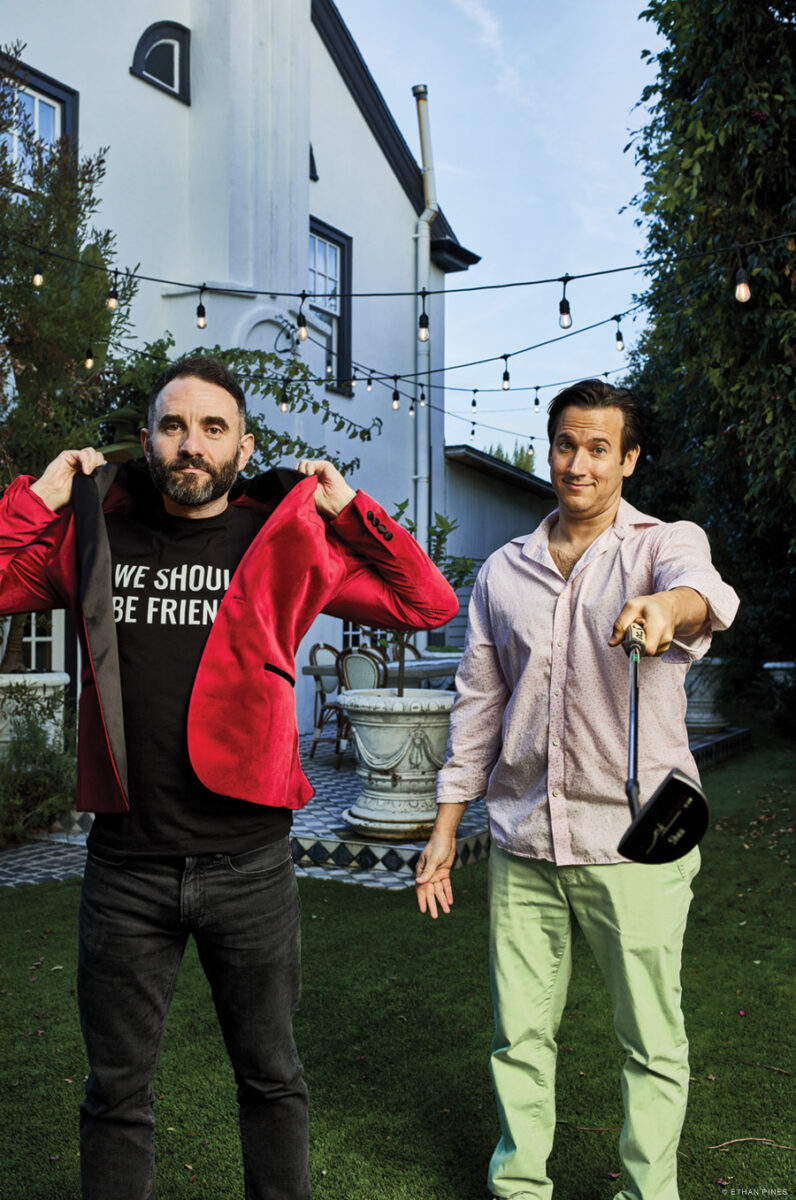
“Breaking balls is love language,” declares Karo, who at another point in our interview, mocks his friend for musing that he fancies himself a “thought leader.”
The key is balancing the playful ribbing with sensitivity and empathy—traits they’ve developed as they’ve gotten older and try to pass on to their listeners. “I don’t know what Frat Boy Aaron’s friendship podcast would’ve sounded like,” laughs Rosin, who used to be on Karo’s Ruminations email list and would write back to him about her favorite jokes. “I think he’s the kind of person that just gets better the more you get to know him. He’s a big personality, he can be a loud personality … [but] he gives advice from a place that’s very empathetic, which is not something I think everyone would necessarily associate with Aaron. You’ve just got to get in there with him and you’ll realize he’s very loving and affectionate.” Rosin—who, according to the hosts, belongs to a healthy demographic of female listeners who tune in hoping to help their male partners make new friends—adds that Ritter “on the podcast is just like the best version of Matt” and that both of their abilities to be open with their emotions has “definitely tapped into something that a lot of people are thinking about.”
The advice they give during a segment called “Asking for a Friend,” in which they take listener questions from social media, isn’t always complicated. It might be something as small as sending a simple text to check in on a friend or remembering to ask how someone is actually doing after watching a game with them. “Someone that could really use a check in, you’re not gonna know that from the group text,” says Ritter, adding that he really needed his friends to be there for him when his dad died two years ago. “When you strip away all of it, friendship is just about showing up.”
If that seems oversimplified, it could be helpful to take stock of your own friendships (a “friendship audit,” as Karo and Ritter called it on a recent episode). My own self-audit yielded mixed results. For me, the group text with my closest college friends is primarily about sports these days. So are the texts with my oldest childhood friend, possibly with excessive trash talk. Making new dad friends in my tight-knit Philadelphia neighborhood community has been an unexpected joy of fatherhood, but the making of actual plans generally revolves around the kids. Rarely do I actually call a friend unprompted.
“The one thing I’ve learned about friendship is it’s the most underserved relationship,” says Ritter, who with a new baby, is currently in the new father phase of friendship, trying to be deliberate about putting his number in the phones of other dads. “Men weren’t taught to prioritize friendship. We’re taught that if you get married, get a good job, and have a nice house and have kids, you have everything you need to be happy. But, as it turns out, you need friendship. … So we’re just basically saying, ‘Hey guys, you gotta prioritize it.’”
Karo cites a 2022 New York Times article about research showing a casual and unexpected check-in text can be more powerful than we think to those on the receiving end. But do they happen enough? Last year, US Surgeon General Vivek Murthy released an advisory declaring a “public health crisis” of loneliness, isolation, and lack of connection in our country. “When men don’t have friends, it’s not good for anyone,” Karo says. “It’s not good for them. It’s not good for women. It’s not good for society.”
Ritter says they’re “careful to not say we’re mental health experts” and he also acknowledges that they “just invented” the idea of being friendship experts. “But I wouldn’t say we’re faking it until we make it—because if you actually look at it, Aaron is the connector,” he says. “He’s got 10 different friend groups; when he has a party or event, he introduces people and then they become lifelong friends. And I like to entertain and throw all kinds of wacky parties in my house. I bring people together; that’s who I am at my core.”
Self-billed as the No. 1 friendship podcast in the country, the show has had a “cultural impact that I don’t know that I would have foreseen a year ago,” says Karo, adding that it’s drawn “tens of thousands of listeners from across the country.” Their “Man of the Year” Instagram page has more than 125,000 followers and on their website they sell “We Should Be Friends” merchandise. “When we started this, we really didn’t know how big it was gonna get, how much it was gonna resonate, or how desperately people really needed to talk about friendships, especially men,” says Ritter.
With that in mind, the two have big plans to grow the “Man of the Year” brand. While they’ve been happy with the guests they’ve already interviewed on the show, they hope to land bigger ones—from the surgeon general to famous friends like Matt Damon and Ben Affleck. They’re developing new formats that include a self-help book for men, a reality show, a sitcom, and a tour during which they’ll tape their show live while including the crowd in segments (think a dating game, but to match audience members together as friends). They were invited to perform in May at the Netflix Is a Joke comedy festival, where they’ll try out that interactive version of their show.
“Last year we built the podcast and this year we’re building the business,” Karo says. “We really want to be a media company with friendship at its core.”
“We are trying to build community around this,” adds Ritter. “This isn’t like other podcasts or comedy shows where you’re one way on the microphone. Our goal is for other people to take action and go out and make friends.”
Ritter and Karo try to take their own advice to heart and constantly evaluate where they are with their friendships. Karo acknowledges he hasn’t been as close as he’d like with his college buddies over the last few years, and that even with his “Man of the Year” crew things change since he’s the only single one. His 2024 New Year’s resolution was to “honor the inner circle.”
Ritter plans to do the same, and he has a new idea—for himself and listeners—to send gifts to close friends for no reason. “As you get older, you don’t see people as much,” he says. “So you really have to figure out how to make those relationships meaningful.”
Talking with Karo every week on the podcast has helped him “navigate all that stuff,” says Ritter, adding that his and Karo’s own friendship has only grown stronger. “We’re very open with each other and very vulnerable with each other. Especially with men, a lot of stuff gets unsaid. But I think, with him and I, the main thing is that we say it all now.”
Their relationship perhaps can be summed up by how they close every episode, when the comedy and banter is pushed aside. “Be good to yourself, be good to your friends,” Karo says. Then, the buddies of 35 years both say, in unison, something that most male friends probably don’t say enough:
“Love you, buddy.”



